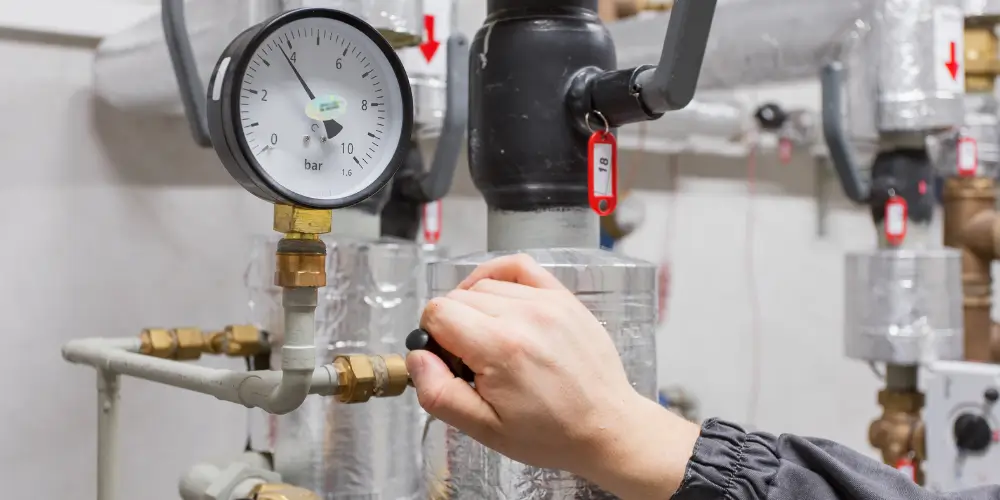Is a Gas Safety Certificate Mandatory? You must obtain a Gas Safety Certificate (GSC) annually if you own gas appliances as a homeowner or landlord. This certification, validated by registered Gas Safe engineers, guarantees that your installations meet the stringent safety norms stipulated under the Gas Safety (Installation and Use) Regulations 1998. Besides maintaining legal compliance, securing a GSC protects from severe legal repercussions such as financial fines and compromised insurance statuses. This certificate not only assures tenant safety but also boosts property value. Understanding the deeper implications might provide insights into additional benefits and responsibilities associated with gas safety regulations.
Key Takeaways
- Gas Safety Certificates are mandatory for landlords to ensure legal compliance and tenant safety.
- Homeowners must also obtain a Gas Safety Certificate for all gas appliances.
- Annual inspections by Gas Safe-registered engineers are required to maintain the certificate.
- Non-compliance can result in legal consequences, including fines and prosecution.
- The certificate validates safety compliance, enhancing property market value and insurability.
Table of Contents
Legal Obligations for Landlords UK
As a landlord in the UK, you must arrange for an annual inspection of all gas appliances and flues in your rental properties to obtain a Gas Safety Certificate.
Suppose you fail to comply with these requirements. In that case, you face serious penalties, including fines and possible property renting restrictions.
You must understand that these obligations aren’t only legal requirements but also vital measures to guarantee tenant safety.
Annual Inspection Requirements
To comply with legal obligations in the UK, landlords must guarantee that all gas appliances, fittings, and flues provided for tenants are inspected annually by a registered Gas Safe engineer. This annual inspection is essential not only for legal compliance but also for the safety and well-being of your tenants.
Every gas appliance and flue must undergo thorough checks for safe operation during these inspections. The inspection frequency is rigid once every 12 months and you must keep detailed compliance documentation. This documentation should include the inspection date, the engineer’s name and Gas Safe registration number, faults found, and remedial actions taken.
You’re also responsible for ensuring that the technicians conducting these inspections have up-to-date training and are competent in gas leak detection and emergency procedures. The safety checklist used during inspections should cover all potential hazards and operational standards of the installed gas systems.
Furthermore, maintaining a regular schedule for gas appliance maintenance can preemptively address issues that might only be discovered during annual inspections. This proactive approach reinforces safety and enhances the appliances’ reliability, ensuring they operate efficiently year-round.
Always make sure that qualified professionals carry out these maintenance activities.
Penalties for Non-Compliance
Failing to obtain an annual Gas Safety Certificate can result in severe penalties for landlords. As a landlord, you’re breaching legal obligations and endangering tenant rights and property safety.
Here’s a breakdown of the non-compliance penalties you face:
- Legal Repercussions: You could be prosecuted under the Gas Safety (Installation and Use) Regulations 1998. If found guilty, the penalties can include criminal charges, potentially leading to imprisonment.
- Financial Fines: Unlimited fines can be imposed for breaches. These aren’t fixed and depend on the severity of the oversight and the perceived risk to tenant safety.
- Enforcement Actions: The Health and Safety Executive (HSE) may issue notices demanding remedial action within a specific timeframe. Non-adherence to these notices can escalate the legal and financial penalties.
- Property Risks: Beyond the immediate legal and financial consequences, failure to comply can lead to severe safety violations, jeopardising your property’s insurance status and potential claims or loss of coverage.
Understanding these regulatory consequences is vital. Ensuring compliance not only secures tenant safety but also protects you from substantial legal and financial repercussions.
Prioritise these inspections to mitigate any risks associated with your rental properties.

Homeowners and Gas Safety
As a homeowner, you must understand that obtaining a gas safety certificate isn’t only mandatory but essential for ensuring the safety of your property.
You must adhere to stringent safety practices, including regular inspections and immediate repairs of gas appliances.
Failure to comply can result in legal penalties and severe safety hazards.
Is Certification Mandatory?
If you own a home with gas appliances, securing a Gas Safety Certificate isn’t just advisable—it’s a legal requirement. Understanding the significance of the certification helps guarantee legal compliance and the safety and functionality of your gas systems. Here’s a breakdown of what you need to know:
- Certification Process: A registered engineer must inspect your gas appliances annually. This includes checking the safety of your gas supply, appliance connections, and the proper functioning of safety devices.
- Certification Costs vary depending on the provider and the number of gas appliances. However, considering the potential risk of non-compliance, the cost is a necessary investment in safety.
- Certification Frequency: Annual certification is mandatory. Remember, regular checks help maintain gas safety standards and preempt potential hazards.
- Certification Validity: A certificate is usually valid for one year from the issue date. Keeping track of its validity is essential to remain compliant with legal requirements.
Be aware of certification myths, such as exemptions for certain types of properties or the fact that newer appliances don’t require checks.
No such certification exemptions exist; all gas appliances must be certified without exception. Understanding these elements can greatly enhance the certification benefits, safeguarding your property and occupants.
Recommended Safety Practices
While securing a Gas Safety Certificate is vital, you should adopt regular safety practices to maintain your gas appliances effectively. This includes setting up a protocol that involves regular maintenance and thorough risk assessments to safeguard against potential hazards.
Implementing a rigorous schedule for appliance inspections is critical. You must engage certified professionals to inspect and service your appliances annually to guarantee they operate safely and efficiently. This is not just a safety measure but also a way to enhance the longevity of your appliances.
You must also invest in quality safety equipment and verify that it is always operational. Equip your home with gas leak detectors and carbon monoxide alarms to provide early warnings of a leak or other malfunction. Here’s a concise guide to managing your gas safety:
| Activity | Description | Frequency |
| Inspections | Professional review of all gas appliances | Annually |
| Maintenance | Routine checks and repairs | As needed |
| Emergency Drills | Tenant education on emergency procedures | Bi-annually |
| Leak Detection | Installation and testing of gas detectors | Every 6 months |
| CO Awareness | Install and test CO alarms | Every year |
Responsibilities of Tenants
As a tenant, you’re responsible for the maintenance and safety of your gas appliances.
You must promptly report any gas leaks or faults in the operational systems to your landlord or property manager.
Ensuring these issues are addressed quickly mitigates risks and adheres to legal safety standards.
Tenant-Owned Appliances
You are responsible for guaranteeing that tenant-owned appliances meet the safety standards of the latest gas safety regulations.
As a tenant, your obligations extend beyond mere possession to encompass a proactive role in the safety and maintenance of your appliances. Understanding and adhering to these requirements isn’t only a legal duty but an essential aspect of safeguarding your safety and that of others.
Here are your key responsibilities:
- Appliance Maintenance: Regularly service all your gas appliances, including annual check-ups by a certified professional, to guarantee they function safely and efficiently.
- Safety Awareness: Stay informed about the latest safety protocols and potential hazards associated with gas usage. This involves recognising signs of malfunction, such as unusual odours or sounds.
- Installation Standards: Guarantee that new appliance installations comply with gas safety regulations. Only qualified professionals are used for installation to avoid improper setups that could lead to accidents.
- Legal Rights and Obligations: Familiarise yourself with your legal rights concerning appliance ownership and tenant responsibilities. This knowledge will empower you to make informed decisions and take appropriate actions when necessary.
Reporting Gas Issues
How should you proceed when encountering a gas issue in your rented property? First, you must be equipped with knowledge of gas leak detection. Recognise signs such as a sulfuric, rotten egg smell or hissing sounds near gas lines.
Immediately use the emergency gas shutoff valve to halt gas flow and contact emergency services to mitigate risk.
Next, make sure you’re informed about carbon monoxide awareness. Symptoms of exposure include dizziness, headache, and nausea, which necessitate urgent action.
If you suspect carbon monoxide presence, it’s critical to ventilate the area and promptly call for professional assessment.
Adhering to tenant reporting procedures is key. Document and report all incidents related to gas safety to your landlord.
In your communications, include specific details like the issue’s time, date, and nature. Maintaining accurate gas service records helps guarantee that all gas appliances receive timely inspections and maintenance, which is vital for preventing future issues.
Lastly, familiarise yourself with the landlord’s emergency response plans. Knowing these plans enhances your preparedness to act swiftly and effectively.
Continuous gas safety education helps you understand your responsibilities and the importance of regular appliance checks and immediate issue reporting.

Gas Safety in Commercial Properties
As a business owner, you must obtain a CP42 certificate to guarantee that your commercial property complies with gas safety regulations.
This certification confirms that all gas installations and appliances in your premises are thoroughly inspected and meet stringent safety standards.
Failure to comply can result in severe penalties, underscoring the necessity of maintaining current and valid documentation.
CP42 Certificate Overview
Suppose you own or manage a commercial property. In that case, obtaining a CP42 certificate guarantees your premises meet the stringent gas safety regulations.
The CP42 certificate details are significant for legal compliance and ensuring safety in your commercial environment.
Here’s a clear breakdown of what you need to know:
Inspection Frequency Guidelines
Gas safety inspections must be conducted annually. Adhering to these guidelines guarantees that all gas appliances and connections are maintained safely.
Certificate Validity Period
The CP42 is valid for 12 months from the issue date. To avoid lapses in compliance, it is essential to schedule the next inspection before the current certificate expires.
Common Inspection Findings
Frequent issues include improper appliance ventilation, worn-out seals and fittings, and outdated safety controls. Recognising these common faults can help you prepare better for inspections.
Role of Gas Engineers
Qualified gas engineers are authorised to conduct these inspections. They guarantee that your gas systems are up to code, documenting their findings and advising on necessary repairs or adjustments.
Compliance for Businesses
Guaranteeing compliance with gas safety regulations is vital for your business’s operational integrity and the well-being of all who enter your commercial premises. As a business owner, you’re tasked with rigorous business responsibilities, including abreast of regulatory updates and implementing robust risk management strategies.
It’s not just about adhering to the law; it’s about creating a safe environment through proactive measures. You must establish regular compliance checks and safety audits to verify that all gas appliances and systems meet the stringent standards set forth by governing bodies. This isn’t a one-time task but an ongoing commitment.
Inspection schedules should be meticulously planned and executed without fail. Employee training is equally important; your staff should be well-versed in operational safety protocols and emergency procedures. This training guarantees everyone can act swiftly and effectively should a gas safety issue arise.
Moreover, staying updated with regulatory updates is imperative. These regulations can change, and your compliance must evolve correspondingly. Failure to comply can result in severe legal consequences and endanger lives.
The Gas Safety (Installation and Use) Regulations 1998
As a property owner, you must understand that the Gas Safety (Installation and Use) Regulations 1998 set strict standards for gas systems in your properties.
These regulations mandate regular checks and maintenance, ensuring all installations are safe and meet legal standards.
Non-compliance can lead to severe penalties, emphasising the importance of securing a valid Gas Safety Certificate to protect your tenants and investment.
Overview of the Regulations
While the Gas Safety (Installation and Use) Regulations 1998 may seem complex, they’re essential for guaranteeing public and residential safety.
You must understand that these regulations set the compliance standards for the safe installation, maintenance, and use of gas systems and appliances in domestic and other properties. If you’re a landlord, you’re directly responsible for adhering to these mandates to protect tenants and guarantee the operational integrity of gas installations.
Here are the key components of the regulations:
- Landlord Responsibilities: Landlords must ensure that all gas appliances, pipework, and flues are maintained safely. Annual safety checks are mandatory and must be performed by a Gas Safe registered engineer.
- Tenant Rights: Tenants have the right to view the gas safety certificate that verifies checks and maintenance have been performed according to the required standards.
- Inspection Frequency: The law requires at least an annual and immediate inspection if any potential issues are reported or suspected.
- Emergency Procedures: Clear guidelines are provided for immediate actions in case of a gas leak, guaranteeing landlords and tenants know how to respond to emergencies.
Understanding these regulations guarantees you’re compliant and contributing to a safer living environment.
Impact on Property Owners
Property owners must navigate the complexities of the Gas Safety (Installation and Use) Regulations 1998, which greatly impact their legal responsibilities and financial outlays.
You must guarantee that all gas installations and appliances are regularly inspected and certified by a registered engineer. This isn’t just about legal compliance; it’s a critical component of property management that safeguards tenant rights and guarantees their safety.
Your maintenance responsibilities include arranging annual safety checks and retaining records for at least two years. Failure to comply can lead to severe penalties, including fines and imprisonment, highlighting the seriousness of these regulations.
Furthermore, adherence plays a significant role in the risk assessment of your property, potentially influencing insurance implications. Insurers may require proof of compliance to provide cover, and lapses could result in denied claims or increased premiums.
Additionally, these regulations intersect with energy efficiency goals. Efficient, well-maintained gas systems reduce energy consumption and lower carbon emissions, aligning with broader environmental targets.
This dual focus on safety and sustainability necessitates a proactive approach in your property management strategy. You must guarantee that all gas appliances meet current standards and contribute to a safer, greener environment.

Importance of Using Gas Safe Registered Engineers
When you hire a Gas Safe registered engineer, you ensure that the professional handling your gas systems has undergone rigorous assessment to obtain their credentials.
Employing engineers without proper registration contravenes legal standards and exposes you to significant safety risks.
Always verify an engineer’s Gas Safe registration to safeguard your property and personal safety from the hazards associated with improper gas installations and repairs.
Verifying Engineer Credentials
Verifying that your gas engineer is Gas Safe registered isn’t just a formality; it’s a critical safety measure. This step is essential to protecting your safety and guaranteeing the reliability of your gas systems.
When you’re verifying an engineer’s credentials, consider the following thorough steps:
- Checking Registration Status: Always confirm that the engineer is listed on the Gas Safe Register. This is the official list of gas engineers legally permitted to work on gas appliances.
- Assessing Experience Levels: Evaluate the engineer’s experience, specifically in the type of work you require. Experience is a major indicator of their capability to handle complex situations.
- Understanding Certification Types: Different gas work demands specific certifications. Verify that the engineer holds the right certification for the job at hand, whether it’s for domestic or commercial work.
- Reviewing Past Inspections and Compliance History: Check the outcomes of previous inspections and confirm their history of compliance with safety standards. This review can reveal their dedication to safety and precision in their work.
Always remember, the safety of your household or business depends largely on these steps.
Risks of Unregistered Services
Hiring unregistered gas engineers exposes you to significant risks, including the potential for improper installations and unsafe gas work. Engaging with individuals not certified by the Gas Safe Register jeopardises your safety and entails substantial unregistered risks.
These safety hazards can lead to catastrophic outcomes, such as gas leaks, explosions, and carbon monoxide poisoning, which can be prevented with qualified interventions.
In addition to immediate safety concerns, the financial implications are considerable. Unsanctioned work often voids warranties, leading to costly repairs and replacements you’ll need to fund out of pocket.
Employing unregistered personnel can have legal consequences, including fines and sanctions, which can complicate your legal standing in any related proceedings.
Insurance complications arise when claims are rejected due to non-compliance with safety norms. This leaves you financially vulnerable in the face of damage or loss.
Furthermore, liability issues could ensue, holding you accountable for mishaps due to non-professional work. Reputation damage is another concern, particularly if you’re a landlord or business owner, affecting your trustworthiness and operational stability.
In emergencies, the lack of proper documentation and adherence to safety protocols can delay critical response efforts, exacerbating the crisis.
Always verify credentials to mitigate these risks.
Benefits of Obtaining a Certificate
Obtaining a gas safety certificate guarantees that your appliances operate at peak efficiency, reducing energy consumption and utility bills.
This certification can boost your property’s market value, making it more attractive to potential buyers or renters who prioritise safety and compliance.
You’ll also meet legal requirements, protecting yourself from fines and legal consequences.
Ensuring Appliance Efficiency
By securing a Gas Safety Certificate, you directly enhance the efficiency of your heating and cooking appliances. This certification isn’t just a formality; it’s a vital component of maintaining appliance integrity and performance. Here’s how:
Appliance Maintenance
As mandated by the certificate, regular servicing guarantees that gas appliances are in top working condition. This prolongs the appliance’s life and prevents wear and tear inefficiencies.
Energy Efficiency
During safety checks, any issues leading to higher gas consumption are identified and rectified. This means your appliances use less energy, leading to significant cost savings and a lower environmental impact.
Performance Enhancement
Certified technicians assess and tune your appliances for peak performance. This attention to detail guarantees that each unit operates at its best, providing greater functionality and reliability.
User Education
Part of the certification process involves educating you, the user, on proper appliance usage and maintenance. This knowledge empowers you to make informed decisions, further enhancing the efficiency and lifespan of your appliances.
Adhering to these standards ensures your safety and that you’re making the most of your investments in gas appliances.

Enhancing Property Value
Securing a Gas Safety Certificate greatly boosts your property’s value. Demonstrating compliance with safety standards enhances your property’s appeal and market competitiveness. This certificate isn’t just a regulatory requirement; it’s a strategic investment in your property’s marketability and security.
A Gas Safety Certificate increases buyer confidence and rental desirability, signalling that your well-maintained property prioritises tenant safety. This certification can considerably influence the decision-making process of potential buyers or renters, making your property a preferred choice.
| Benefit | Impact on Property | Long-term Value |
| Buyer Confidence | Increases trust and interest | Enhances resale potential |
| Rental Desirability | Attracts responsible tenants | Sustains higher rental income |
| Maintenance Records | Demonstrates proactive upkeep | Reduces future repair costs |
| Energy Efficiency | Lower utility bills | Increases investment attractiveness |
Efficiently maintained systems documented by a Gas Safety Certificate lead to reduced operational costs, contributing to the energy efficiency of your property. This attracts environmentally conscious buyers and adds to the investment attractiveness through potential energy savings. Remember, increasing your property’s efficiency is a surefire way to boost its overall value and appeal.
Selling or Renting Your Property
Securing a gas safety certificate isn’t just a legal formality when selling or renting a property; it’s essential for safeguarding the transaction’s integrity.
This certification can greatly elevate your property’s market value and attract discerning buyers or tenants who prioritise safety.
Furthermore, it can impact your eligibility and potential costs for property insurance, potentially lowering premiums due to demonstrated compliance with safety standards.
Importance of Certification in Property Transactions
Obtaining a gas safety certificate is vital when you’re looking to sell or rent out your property. This document plays a significant role in property transactions, enhancing buyer awareness and seller obligations. Here’s why:
- Safety Assurance: A valid certificate conveys to potential buyers or tenants that the gas installations meet the required safety standards. It reassures them that they’re investing in a secure environment, essential for sustaining market demand.
- Liability Issues: As a seller or landlord, you’re legally obliged to guarantee the safety of your gas equipment. Without this certification, you could face severe legal consequences if gas-related incidents occur.
- Negotiation Leverage: A gas safety certificate strengthens your position in negotiations. Prospective buyers or renters might be more inclined to agree to your terms when they perceive a commitment to maintenance and safety.
- Investment Protection: Confirming all gas appliances are certified safe protects the value of your property and guards your investment, deterring future complications that could arise from neglected maintenance.
Adhering to these regulatory requirements isn’t merely about compliance but demonstrating due diligence and fostering trust in a competitive real estate market.
Impact on Property Value and Insurance
A gas safety certificate greatly boosts your property’s market value. It can positively influence your insurance premiums when selling or renting. This certification is critical in elevating your property’s appraisal, as it directly impacts buyer perception by showcasing a commitment to safety and compliance.
Buyers and renters are increasingly aware of the potential hazards associated with gas installations, and your proactive measures provide a tangible sense of investment security and value retention.
Furthermore, a gas safety certificate enhances your property’s market competitiveness. It is a robust selling point that differentiates your asset in a crowded market.
Insurance companies favour properties that demonstrate minimised risk factors; hence, meeting these safety standards could reduce insurance premiums. This is largely because the risk assessment conducted by insurers considers such certifications as a mitigative measure against potential claims related to gas incidents.
Lenders also frequently require stringent property safety requirements before sanctioning loans. By obtaining this certificate, you meet lender requirements upfront, streamlining the financial transaction process and reinforcing the property’s appeal to cautious investors and discerning buyers alike.
Frequently Asked Questions
How Often Should Gas Appliances Be Inspected in Residential Properties?
Manoeuvring the labyrinth of gas appliance maintenance, you should have professional inspections annually. This frequency upholds safety compliance, aligns with residential property guidelines, and guarantees landlords fulfil their responsibilities while keeping tenants aware and protected.
Can a Homeowner Issue Their Own Gas Safety Certificate?
You can’t issue your gas safety certificate; it requires a professionally qualified inspector. DIY certification breaches gas safety regulations, risking legal implications and compromising certificate validity and appliance inspection standards for safety compliance.
What Are the Penalties for Not Having a Gas Safety Certificate?
Suppose you’re caught without a valid gas safety certificate. In that case, you’ll face hefty fines, legal consequences, and strict enforcement actions due to non-compliance with safety regulations. This highlights landlord responsibilities and potential liability issues.
Are Gas Safety Checks Required for Unused Appliances?
Even dormant dragons breathe fire; unused appliances need regular checks to prevent gas leaks. Adhering to safety regulations and homeowner responsibilities, guaranteeing professional inspections comply with frequency guidelines, and safeguarding through diligent appliance maintenance and leak prevention.
How Long Is a Gas Safety Certificate Valid?
Your gas safety certificate’s validity is typically 12 months. Compliance with legal requirements necessitates annual renewal to meet safety regulations, maintain homeowner responsibilities, and ensure your property management adheres to inspection frequency and compliance standards.


